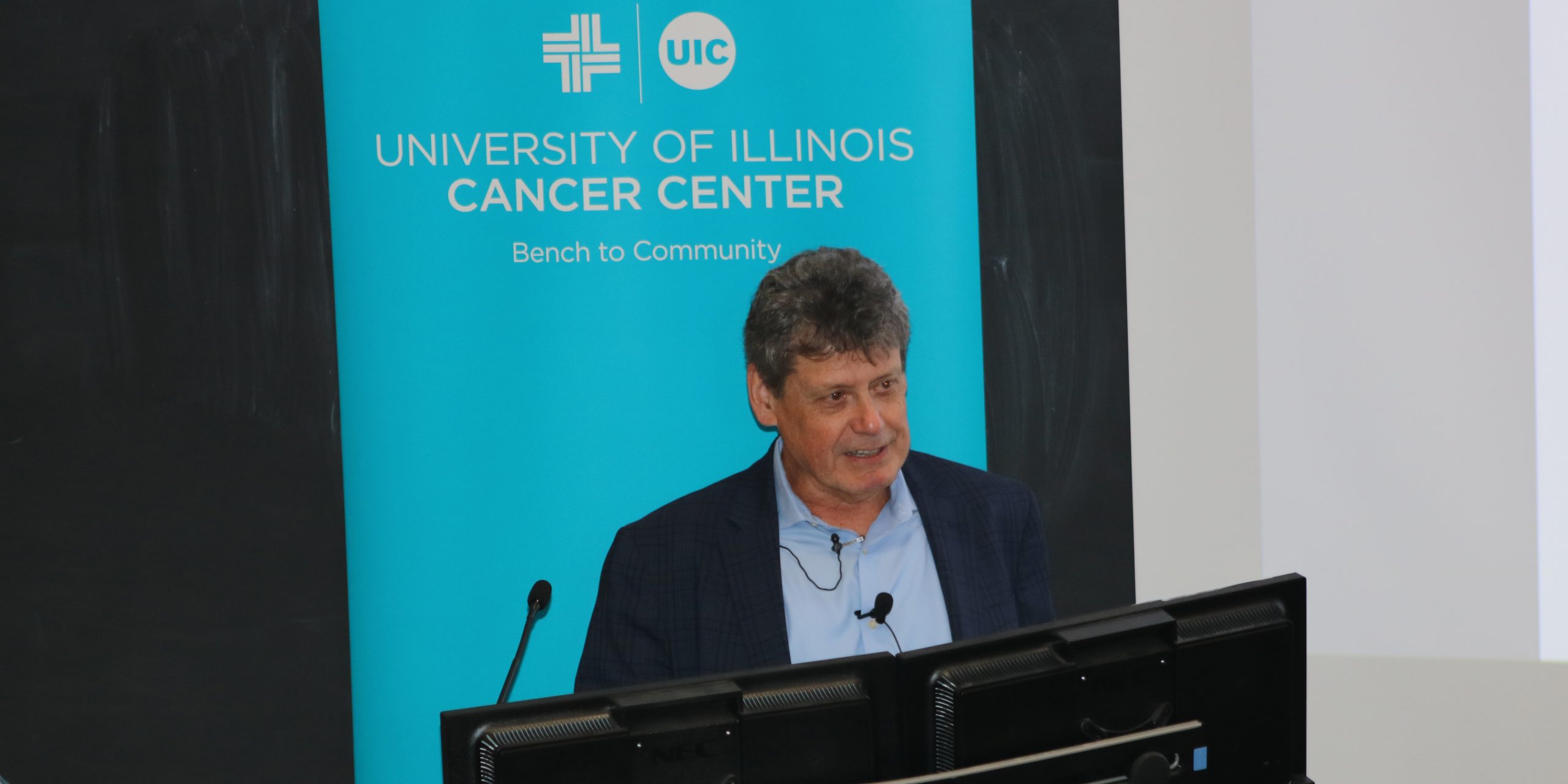
William Dalton is using data to find a cure for cancer.
Dalton, PhD, MD, is executive chair and founder of M2GEN, a national biotechnology subsidiary of the Moffitt Cancer Center, Tampa, Florida, whose mission is to connect patients to a cure by accelerating the discovery and delivery of precision medicine. Dalton shared his vision of moving from reactive to proactive medicine through data science as the speaker at last week’s University of Illinois Cancer Center’s Distinguished Lecture Series.
A key question in today’s health care landscape is “how do we, as a society, create a health care and research system which will identify the needs of individual patients?” Dalton asked. “And how can we identify markers that will predict needs and risks so that interventions can become preemptive; identify molecular signatures for patients to predict responses to therapy; and raise the standard of care for all patients by integrating new technologies in an evidenced based approach to maximize benefits and reduce costs?”
The answers, Dalton said, is through the creation of an ecosystem of shared value for health care through collective input. Collective input is based on the idea that social problems arise from and persist because of a complex combination of actions and omissions by players in all sectors, and can therefore can be solved only by the coordinated efforts of those players, from businesses to government agencies, charitable organizations, and members of affected populations.
“What’s needed is nothing less than changing how the system functions,” said Dalton, a past president, CEO and director of Moffitt Cancer Center, a National Cancer Institute-designated comprehensive cancer center in Tampa. “Collective impact efforts have made significant progress on issues as diverse as education, homelessness, juvenile justice, substance abuse, childhood obesity, job creation and pollution.”
Along with being a noted oncologist, Dalton is a founding member of ORIEN (Oncology Research Information Exchange Network), a unique research partnership among 19 of the nation’s leader cancer centers that deliver informatics-based solutions to accelerate therapy discovery, development and delivery of personalized medicine.
ORIEN partners utilize a common protocol entitled Total Cancer Care, a trademarked proprietary standardized system for tracking patient molecular, clinical and epidemiological data and follows the patient throughout his or her lifetime. More than 300,000 patients have consented to date, and along with sharing their data, they consent for tissue to be used to generate laboratory data, and agree to be re-contacted for future studies such as clinical trials.
Numerous challenges exist in therapy development and clinical trials, Dalton said. Trials are too slow and costly; individual patients are identified for trial at time of need; there’s a high ratio of screening to actual enrollment; costs of bring a drug to market could be as high as $2.6 billion and take up to 15 years; and patients with an aggressive cancer often have a narrow “trial matching window”, making enrollment challenging.
“With ORIEN, our goals are to enroll a high volume of patients in our Total Cancer Care Protocol, anticipate the needs of patients enrolled in TCC by understanding their clinical and molecular properties, follow TCC consented patients over time and track disease progression or recurrence, proactively identify patients that are appropriate for target-based trial, and rapidly accrue and analyze the data to address a patient’s need,” Dalton said.
Seven trials have been launched through the ORIEN Clinical Trials Network since 2018, with three being industry-sponsored (including one umbrella trial that has many different treatment arms within the trial) and four investigator-initiated trials that include two basket (testing the effects of one drug on a single mutation in a variety of tumor types at the same time) trials.
Total Cancer Care offers numerous benefits to patients, Dalton said. It can provide lifelong partnerships between patients, clinicians and researchers to understand and better address patient need; proactively match patients’ characteristics to emerging targeted therapies by knowing, in advance the patient’s phenotypic and genotypic information; contribute to cancer research that may benefit others; and gives access to information and learning about their specific cancer and patients who are like them.
“Every great achievement was once considered impossible,” Dalton said. “But together we can build the ecosystem to serve our patients.”
Click here to view Dalton’s entire presentation: https://www.youtube.com/watch?v=KlR-ABZPMTk
